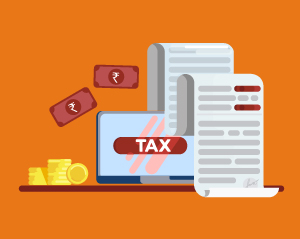The Government of India charges income tax from taxpayers earning above a certain amount. All taxpayers are responsible for filing an Income Tax Return (ITR) every year if the total income is above specified threshold or if the taxpayer falls in the category of people who are mandatorily required to file their Income tax returns as per the conditions mentioned under The Income Tax Act, 1961.
A lot of people find the process of tax computation and payment confusing. However, thanks to several government resources and easy online filing processes, you can now submit your tax return in a matter of a few minutes. In today's digital age, you can submit your return from the comfort of your home or office by simply registering on the Income Tax e-Filing Website.
What is e-Filing?
e-Filing refers to the process of submitting your tax returns electronically. Short for electronic filing, e-Filing can be completed through income tax website. e-Filing can be used by all taxpayers.
e-Filing offers speed, security, and convenience to taxpayers. It also reduces the income tax department’s burden and provides a sophisticated alternative to traditional paper filing.
Eligibility for e-Filing
While there are no specific eligibility criteria for e-Filing, there are certain conditions that require individuals to file an ITR, either offline or via e-Filing. The conditions are mentioned below:
- If your total income exceeds the prescribed income tax exemption limit of ₹3 lakh in a financial year under the new tax regime, it is mandatory to file the return. The income tax exemption limit under the old tax regime is ₹2.5 lakh for an individual taxpayer, ₹3 lakh for resident senior citizen taxpayers aged between 60 and 80 years, and ₹5 lakh for resident super senior citizen taxpayers aged 80 years or more
- Firms and companies must file ITR whether they make a profit or undergo a loss
- You need to file an ITR if you invest in foreign assets or earn from foreign assets
- If you have incurred expenditure of an amount or aggregate of the amounts exceeding ₹1 lakh towards consumption of electricity or if you deposit more than ₹1 crore in one or more current accounts maintained with a banking company or a co-operative bank, filing an ITR is mandatory

Ways to do e-Filing
There are two ways to complete the e-Filing process:
Ways to do e-Filing
Offline
You can download the applicable ITR form from the Income Tax website. The form can be downloaded using Excel Utility or Java Utility. You need to fill out the form offline and save it in XML format. You can then upload this file on the portal again and submit your return.
Ways to do e-Filing
Online
You can enter all relevant information and submit the form on the Income Tax website itself. This option can be used in the case of ITR 1 and ITR 4 forms.
Individuals being a resident (other than not ordinarily resident) having total income upto ₹ 50 lakh, having Income from Salaries, one house property, other sources (Interest etc.), and agricultural income upto ₹ 5,000/- can file ITR 1 (Sahaj). Individuals, HUFs and Firms (other than LLP) being a resident having total income upto ₹ 50 lakh and having income from business and profession which is computed under sections 44AD, 44ADA or 44AE and agricultural income upto ₹ 5,000/- can file ITR-4(Sugam).
Why should you file an income tax return?
All taxpayers are responsible for filing an Income Tax Return (ITR) every year if the total income is above specified threshold or said person fall in category of person who are mandatorily required to file their Income tax returns.
All taxpayers are mandated to submit an Income Tax Return (ITR) every year by respective due dates as per the law to report their income and claim a tax refund, if applicable. Taxpayers who fail to file their return will have to pay fees of ₹ 5,000 (₹ 1,000 if the total income is less than ₹ 5 lakh) under Section 234F.
Benefits of filing income tax returns
Tax refund
Easy availability of loans
Quick visa sanctions
Multiple credit cards
Tax loss harvesting
Securing Government Tenders
For Buying Term Insurance
Financing for Startup Ventures
You receive a tax refund if your final tax liability is less than tax which is already paid in advance.
By filing your returns, you benefit from the opportunity to claim tax benefits under the various sections of The Income Tax Act, 1961 and save a lot of money.
Your previous returns are one of the first things that most lenders check when you apply for a loan. Filing your income tax return on time is a sign of financial discipline and can help you get good loan offers at low-interest rates
Some countries may ask for your ITR along with the visa application. You may find it difficult to get a visa without your previous ITRs
Credit card issuers usually check your ITR to get an idea of your income. Your ITRs can help you get great credit card deals at favourable interest rates suited for your income group
Tax loss harvesting refers to offsetting your capital gains by harvesting your losses through the ITR. This helps you lower your tax liability and save money
Filing your ITR is essential if you are trying to secure a government tender. The ITR is one of the required documents that you must submit along with the tender application.
Insurance companies ask for your ITR before selling you a term plan. Timely income tax e-filing can help you buy a term insurance plan and protect your loved ones in the future.
A startup requires financing, and investors will likely ask to see your ITR to run a background check on you. Filing your ITR is essential for securing adequate funding for your startup.
Do E-Filing in 3 Easy Steps
The process of E-Filing has three simple steps
Step 1 - Log in to the E-Filing Portal:
Go to https://www.incometax.gov.in/iec/foportal/ Log in using your user ID and password. If you don’t have an account, you can create new one.
Step 2 - Prepare your documents and enter the required details:
Please collect your PAN card, bank statements, income proofs and all financial documents such as business records or salary slips. Enter the required details in the E-Filing form.
Step 3 – Complete and submit your return
Review all the information and submit your tax return online. After successfully uploading your Income Tax Return, you will receive an income tax acknowledgement at your registered email address.
Please visit How to File ITR Online? | Steps to e-File ITR | ICICI Prulife for a detailed version.
Types of ITR Forms
Below are the different types of ITR forms:
ITR 1 or Sahaj
The ITR-1 or Sahaj form can be used by resident(other than not ordinarily resident) individuals whose total income for the assessment year includes:
- Income from salary or pension
- Income earned from a house property
- Income earned from other sources (excluding winnings from lotteries and income for racehorses)
- Agricultural income up to ₹ 5000
ITR 2
The ITR-2 form is for individuals or Hindu Undivided Families (HUFs) whose aggregate income is above ₹ 50 lakh. The form is used in the case of:
- Income from salary or pension
- Income earned from a house property
- Income earned from other sources (excluding winnings from lotteries and income for racehorses)
- Income from capital gains
- Assessee who is not eligible for filing ITR-1
ITR 2A
ITR-2A is designed for individuals and HUFs who:
- Have income from a salary
- Own more than one house property
- Does not earn income from capital gains
ITR 3
ITR-3 Form is meant for individuals or HUFs who have income from a business or profession. Individuals or HUFs who have income from the following sources are eligible to file ITR-3 who is not eligible to file ITR-1, ITR-2 or ITR-4
ITR-4 or Sugam
ITR-4 is applicable to resident individuals, HUFs and partnership firms. It is not applicable to Limited Liability Partnerships (LLPs). The form covers the following:
- Business income under presumptive taxation schemes like Sections 44AD or 44AE
- Professional income under presumptive taxation scheme Section 44ADA
- Income from salary or pension up to ₹ 50 lakh
- Income from a house property, not exceeding ₹ 50 lakh, excluding any carried forward losses
- Income from other sources, not exceeding ₹ 50 lakh, excluding lottery and racehorses
ITR 5
ITR-5 can be used by:
- Firms
- LLPs
- Association of Persons (AOPs)
- Body of Individuals (BOIs)
- Artificial Juridical Persons (AJPs).
It can also be used by estates of insolvent persons, estates of deceased persons, investment funds and business trusts.
ITR 6
ITR 6 can be used by companies that do not claim any tax exemption under Section 11. It is important to note that in the case of an ITR 6, the ITR must be filled using e-filing only.
ITR 7
ITR-7 can be used by individuals and entities under the following sections:
139(4A) to 139(4F)
Documents required for e-Filing
You may require the following documents for e-Filing:
General documents
- PAN
- Aadhaar (Linked to PAN)
- Bank account details
Income-related documents
- Salary slips
- Rent receipts for claiming House Rent Allowance (HRA)
- Form 16, Form-16A, Form-16B, and Form- 16C
- Form 26AS
Deductions and exemptions-related documents
- Interest certificates from savings and deposits account
- Home loan details
- Proof of tax-saving instruments, such as insurance
- Income from capital gains
- Rental income, foreign income, and dividend income proofs
Common mistakes made while e-Filing income tax
Here are some common mistakes people often make when filing their ITR:
Wrong tax form
There are different ITR forms based on your source of income and filing status. Remember to go through the Income Tax Department website and select the correct form according to your income
Incorrect PAN or personal information
Entering the wrong details can lead to the rejection of the e-filing or a delay in processing the return
Incorrect bank account details
Incorrect bank account details can lead to delays in receiving refunds. Therefore, be careful to enter the account number, IFSC, and other details accurately
Not claiming all eligible deductions
You can claim tax deductions on savings, investments, and expenses under The Income Tax Act, 1961. Not declaring all eligible deductions can result in paying higher taxes
Not disclosing all income
You are legally mandated to disclose all your income earned in a year. Not revealing all income sources can lead to heavy penalties and fines and is considered tax evasion
Not e-verifying the return
You have to verify the return which is filed. Not e-verifying the return within prescribe time limit can result in the return being treated as invalid
Not filing the return on time
Not filing a return on time can lead to heavy penalties and fines. Remember always to submit the return before the due date
Not reporting capital gains from mutual funds
Capital gains are subjected to long and short-term capital gains tax. Make sure to report these for the purpose of taxation
What is the next step after you have e-Filed your income tax returns?
It is important to e-verify your return after e-filing it. You can e-verify your ITR online through EVC, Aadhar OTP or a signed copy of ITR-V through normal or speed post to “Centralized Processing Center, Income Tax Department, Bengaluru - 560 500” within 120 days from date of filing.
It is also essential to start preparing for the upcoming financial year. You can lower your tax liabilities by investing in tax-saving instruments like life insurance. Life insurance plans are eligible for tax deductions of up to ₹1.5 lakh per annum under Section 80C of The Income Tax Act, 1961. The returns are also tax-free under Section 10(10D), subject to conditions mentioned therein. Moreover, they can offer long-term financial protection to your loved ones and help you achieve your financial goals.
COMP/DOC/Sep/2024/129/7137
Frequently Asked Questions
Who is eligible to file ITR-1 for AY 2023-24?
All resident individuals who meet the following income categories can opt for e-filing ITR-1 for AY 2023-24:
- Total income does not exceed ₹ 50 lakh during the FY
- Income is from salary, one house property, family pension, agricultural income up to ₹ 5000, and other sources:
- Interest from savings accounts
- Interest from deposits, such as a bank, post office or cooperative society
- Interest from income tax refund
- Interest received on enhanced compensation
- Any other interest income
- Family pension: The income of a spouse or minor is clubbed if within specified limits
Who is not eligible to file ITR-1 for AY 2023-24?
Individuals who meet the following criteria cannot opt for e-filing ITR-1 for AY 2023-24:
- Resident Not Ordinarily Resident (RNOR) and Non-Resident Indian (NRI)
- Individuals with a total income exceeding ₹ 50 lakh
- Individuals with an agricultural income exceeding ₹ 5000
- Individuals with an income from lottery, racehorses, legal gambling and other activities
- Individuals with taxable capital gains - short-term and long-term
- Individuals invested in unlisted equity shares
- Individuals with an income from business or profession
- Individuals who are a director in a company
- Individuals with a tax deduction under Section 194N of The Income Tax Act, 1961
- Individuals with a deferred income tax on Employee Stock Ownership Plan (ESOP) received from an employer being an eligible startup
- Individuals who own and have an income from more than one house property
- Individuals not covered under the eligibility conditions for ITR-1
My company deducts TDS. Do I still have to file my ITR?
Even if all taxes are paid on your salary, you must file a return if the employer deducts tax at source on salary. You still need to disclose the income on which tax has been deducted and claim credit for TDS in the Income Tax Return.
Is it mandatory to define the nature of employment while filing a return?
Yes, defining the nature of employment while e-filing your ITR is mandatory. You can choose from the following options:
- Central Government Employee (CGE)
- State Government Employee (SGE)
- An employee of Public Sector Enterprise (PSU)
- Pensioners from CGE, SGE, PSU or others
- Employees from the private sector
- Not applicable in case of family pension income
What types of income do not form part of the ITR 1 form?
The following types of income do not form a part of the ITR 1 form:
- Profits and gains from business and professions
- Capital gains
- Income from more than one house property
- Income under the head ‘other sources of specified nature, such as:
- Winnings from lottery
- The activity of owning and maintaining racehorses
- Income taxable at special rates under Section 115BBDA or Section 115BBE of The Income Tax Act, 1961.
- Income to be apportioned in accordance with provisions of Section 5A
What measures should I take when filing my income tax return?
You must take the following measures when e-filing your ITR:
- Ensure a comprehensive understanding of your ITR form
- Check Form 26AS diligently to verify the accuracy of tax details, including Tax Deducted at Source (TDS), Tax Collected at Source (TCS) and advance or self-assessment tax
- Make sure to file your ITR in a timely manner to avoid penalties and ensure compliance with prevailing tax policies
- Verify your return to confirm the accuracy of the information on your form
- Safeguard all relevant documents, such as bank statements, interest certificates, Form 16 and investment proofs for future reference
What is Form 26AS?
Form 26AS is a comprehensive statement that provides crucial insights into your tax liabilities and payments. It includes various essential components of your financial transactions, including TDS, TCS and payments made towards advance tax or self-assessment tax. Form 26AS plays a pivotal role in the income tax filing process by offering a detailed breakdown of your taxes.
I am an employee without Form 16. How can I file my tax return?
Employees without a Form 16 can file tax returns by following the process mentioned below:
- Start by determining all your sources of income, such as your salary, interest income and other earnings
- Next, refer to Form 26AS to extract details on TDS. Form 26AS can provide you with a comprehensive overview of the taxes deducted by your employer and other entities
- Compute your total income
- Ensure to claim applicable deductions, such as those for investments or expenses, to arrive at the taxable income figure
- Calculate your tax liability based on the applicable slab rates. Once the computation is complete, initiate the process of e-filing
Can someone else fill out the e-filing of ITR on my behalf?
If you, as the assessee, are unable to manage your income tax affairs independently, you have the option to authorise another individual to handle the e-filing of your ITR on your behalf. Below, you can find the types of assessees, their reasons for not e-filing, and the corresponding authorised persons:
- For an individual absent from India: The authorised person shall be a resident authorised person
- For an individual non-resident: The authorised person shall be a resident agent
- For an individual for any other reason: The authorised person shall be a resident authorised person
- For a company (foreign entity) non-resident: The authorised person shall be a resident authorised person
- For a Firm / Limited Liability Partnership (LLP) / Body of Individuals (BOI) / Association of Persons (AOP) non-resident: The authorised person shall be a resident authorised agent or a person treated as an agent under Section 163 of The Income Tax Act, 1961
What penalty is applicable for late e-filing of ITR?
A late filing fee of ₹ 5,000 is applied if the e-filing return is furnished after the due date specified under Section 139(1) of The Income Tax Act, 1961. However, if the total income does not exceed ₹ 5 lakh, the late filing fees are reduced to ₹ 1,000.
People like you also read...








